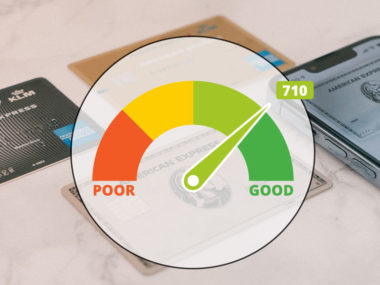A good credit score is necessary in order to take out any kind of loan. For most people, their credit score gradually increases (or decreases) as they take on new debt. Dealing with debt responsibly is the best way to get your credit score to increase. However, if you’re new to the credit world, you might be hesitant to take on new debt at this time. Luckily, there are some ways that you can ease into debt without feeling like you’re drowning.
Understanding the Importance of a Credit Score
Honestly, it would be quite a challenge, if not impossible to improve your credit score without having any debt. It’s right in the name, “credit” score. Having lines of credit is the basis for any good credit score. It would be wonderful if that weren’t the case, but banks and lenders want to know that you understand how to spend money responsibly.
Having credit really is essential to your financial success. If you have a good income, you might not ever necessarily have to apply for a credit card (although it would be beneficial for your credit). However, if you’re ever want to purchase a new car or buy a home, it’s far less likely that you’ll have that much money in the bank in order to purchase it outright. This is where credit comes in.
Having lines of credit, even small ones, lets the credit bureaus, banks, and lenders know that you’re a responsible spender when it comes to credit. You can handle a credit card with a $500 or $1000 limit, without maxing it out or being late on your payments. That will do a lot for your credit score. Then, when you decide that you do want to make the choice to make a larger purchase, the lender will know that you understand the importance of a credit score and you can handle the responsibility.
How to Get Started Building Your Credit Score
I don’t intend to scare you into thinking that you have to go out and get a credit card right this minute. Financial decisions should always take some consideration. Take a look at your current income and decide if making that choice really is in your best interest right now. Whenever you’re ready to start improving your credit score and you’re certain that you can handle a credit card, then it’s time to apply. Before you do, here are some things you should know that might put you at ease.
Start With a Low Limit Credit Card
You can always start with a low limit. Secured credit cards are a great way to introduce yourself to the world of credit. Secured credit cards are easy to be approved for even if you have no credit. The credit limit is usually quite low, which means it will be more manageable for you and you’ll have to put down a deposit in order to spend any money. For example, you give the bank $500 and they will open up a line of credit worth $500 for you to spend with. You can then spend a little bit of money and pay it off as you go. One of the biggest worries with debt, is that you’ll get in over your head. With a secured credit card, you can learn the importance of a credit score without racking up incredible amounts of debt.
You Are in Control of Your Debt
If you’re concerned about having any credit out at all, rest assured that you don’t have to use all of your credit (or anywhere close to all of it). Just because you have a credit card, does not necessarily mean that you have debt. As soon as you spend one dollar on the card, you technically have debt. However, it can never get out of control without your consent. If you’re comfortable spending twenty dollars on your credit card and then paying it off, that’s still building credit. It’s adding positive entries to your credit history, which will influence your overall credit score. Yet, it’s completely under your control.
Try Being a Cosigner on a Loan
In some cases you may be allowed to put your name down as a cosigner on someone else’s loan. By doing so, your credit score will also be affected by the line of credit. However, if you have no credit, this might not always be an option. Some banks and lenders might only let you add your name to the account as a cosigner if the person receiving the loan already has good credit. Usually, the only reason you’d want a cosigner is if you can’t get approved by yourself. If this is the case and you have no credit, the bank may be hesitant to lend money to two individuals with low credit or no credit.
However, if you’re able to get on a loan with someone who already has good credit, you can slowly build up your credit score through this individual over time. Just know that being a cosigner means you’re responsible for this loan if for any reason the other person cannot pay it. In addition, if they fail to pay their bill on time, your credit will also suffer. As such, in many instances, it might be a better idea to just start with a secured credit card instead.
Ways to Keep Your Credit Score Under Control
If you choose to get a credit card or some other line of credit in order to build up your credit score, you can always keep it in check by practicing the three major principles of creating good credit habits: When you’re just starting out, keep your limit low, don’t overspend, and make all of your payments on time. If you practice these three things, you’ll never have to worry about overwhelming debt or a bad credit score.
You should also know that building credit takes time. There’s nothing wrong with being cautious about debt. Don’t ever take on debt that you don’t think you can handle. Starting with a low limit secured credit card before moving up to a larger loan, is a smart financial decision for those with no credit. Be patient with yourself and start making good credit choices right now, but know that everyone is human. Sometimes we make mistakes, but if you get back on track quickly, you can overcome those mistakes with time and land on a good credit score. This way, down the line, when you want to make a larger purchase, you’ll know that your credit score will be in good shape. If someone else’s mistake ends up on your credit report, however, you do have some recourse. Visit our dispute letter resource center for more information and help drafting a letter to the credit bureaus.
More information on debt and your credit score can be found at the Fiscal Tiger credit score resource center.
Image Source: https://depositphotos.com/





